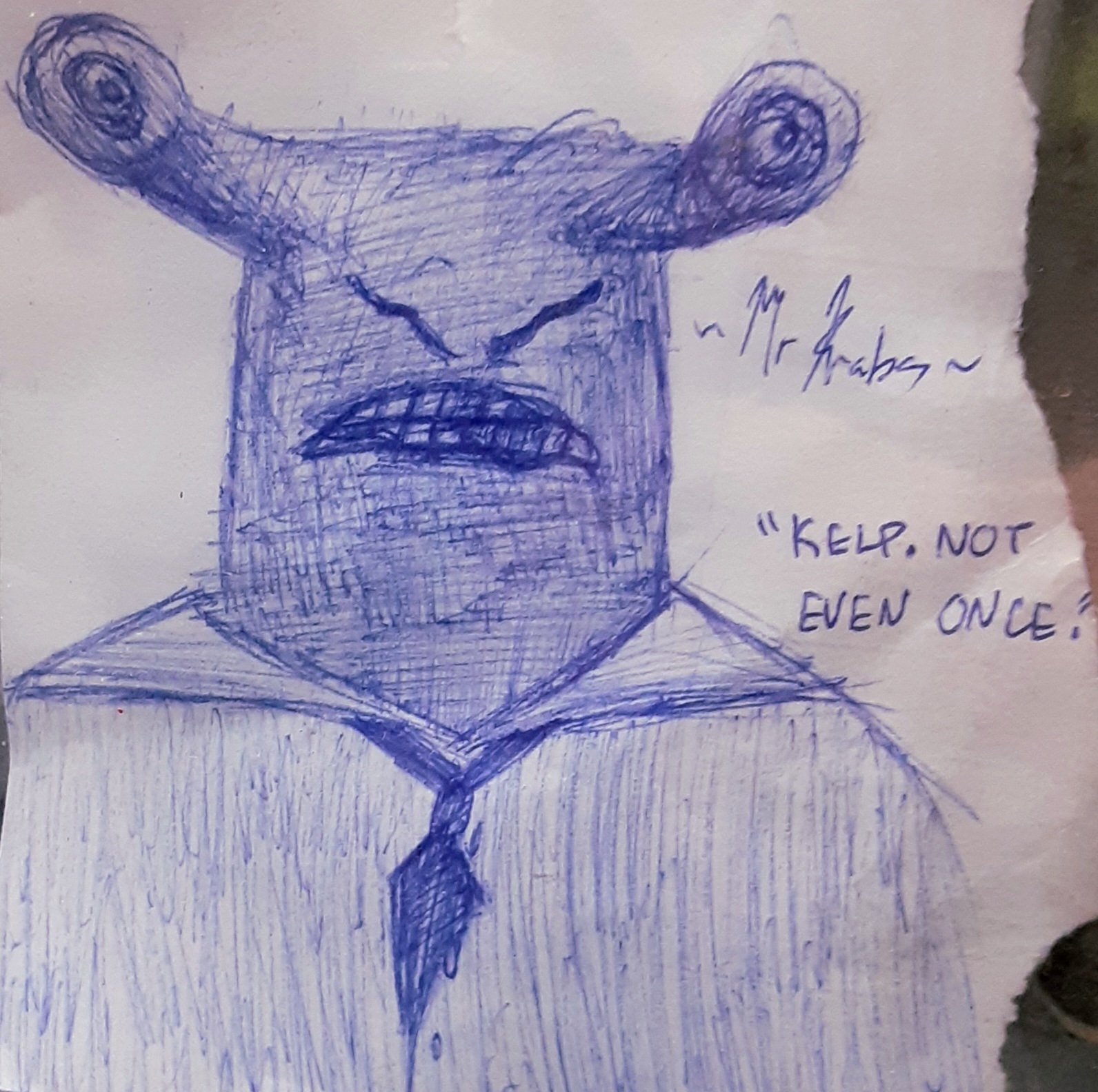In some of the music communities I’m in the content creators are already telling their userbase to go follow them on threads. They’re all talking about some kind of beef between Elon and Mark and the possibility of a boxing match… Mark was right to call the people he’s leaching off of fucking idiots.
I care. I’m just increasingly convinced it’s too fucking late.
Tbh it’s not black and white. I’m sure a big corporation can extract a ton of information on us but there’s still a pretty big gap between having our real names and photos plastered everywhere on social media, or them just knowing where I live and that I spend a lot on steam games. Don’t take the small victories for granted.
It is. They know everything about you. Even every store you have shopped at knows a lot about you. It really doesn’t take much interaction for a company to get a lot of info. It’s relatively easy to get an email and from there, if they wanted, they can get the rest of your profile from a 3rd party who has your data all matched up already. They can also build your profile pretty easily themselves as well.
How can regular people buy this data?
Say I wanted to find out what my profile looks like?
I imagine “you” can’t
you’d likely have to work for some marketing agency and can probably only buy user data in bulk amounts (based on region, or some other desired demographic) with a recurring business plan of course
it wouldn’t be financially beneficial for these companies to sell an individual thumbprint
That makes sense.
So who wants to set up an marketing agency with me?
That makes sense.
So who wants to set up an marketing agency with me?
Yes. I would like this info as well if anyone has it .
If you’re in the US, you can demand a company release the information they have on you, to you, for inspection. It’s more data than you’d think. A LOT more.
Say I wanted to find out what my profile looks like?
Live in the EU.
I do. Now what?
You have the right to request access to inspect the personal information a company stores on you. At least, in the US. And I believe the UK and EU as well but I can’t speak as much to those.
If you want to be truly terrified (or enlightened, however you prefer to think of it), pick any big company that you’ve used and request all the data they have stored on you. The amount of data they’ll have is STAGGERING. Certainly hundreds of pages, possibly thousands. It’s insane.
It’s never too late. Sure, they already have a lot of data on you but you can keep them from getting more.
Definitely. I’m was trying to state that basic info about you is readily available to companies regardless of how you choose to interact with them.
I think personal data poisoning is going to become more prevalent among privacy communities, I would like to see some tooling for this in the next few years.
Im in basically the same position since realistically the change needs to be at an institutional level. I can’t really change anything by myself without excluding myself from most modern services.
We need laws and regulations. But like you I fear it’s too late.
It might not be. Plenty of US states are coming online with privacy rights. If you live in CA, CO, CT or VA you can submit requests to opt out of information sales and for sites to erase your data.
Same here, but that doesn’t stop me from trying where I have the time and energy. One of those ways is voting. So far the government has let these companies wipe their shit onto every corner of the internet, and the 5-10% of us switching apps or emails or… Whatever, aren’t going to change that. It’s not a short-term solution, but I’m starting to think it’s really the only way.
Me. I care I just…fuck. That ship has sailed. I don’t go out of my way to download the big offenders like Tik Tok but…still. Everyone is tracking me. Everyone is selling my information. God knows how many different companies have massive files on me.
deleted by creator
What about a watching self promotional videos that promote ads on an advertising company? Is that okay?
deleted by creator
Even if you get them to care once you show them all they need to do to have a shred of privacy they shrug say something along the lines of “well I don’t have anything to hide anyways” and go back to their merry way. The path of least resistance will always win sadly
Literally saw a comment like that yesterday. Drives me up the wall. I’m in the process of accepting that the average Joe/Jane just doesn’t care about anything but their little bubble. I used to spend so much emotional energy on trying to convince people to stand up for something greater or to at least think more than 2 meters ahead, but now I’m just done. I’ll watch out for myself and the people close to me, everyone else can just evaporate for all I care.
Congratulations, you now have your own little bubble.
Lol true but teaching people better ways is like swimming against the tie. Heck is even hard with people close to me !
I literally just had a friend tell me he joined Threads and how neat it was, etc etc and when I explained why I wouldn’t be joining him, he basically just gave me the old “Well I already know they have all my information so it doesn’t matter”
…like wtf? So you just…give up having any privacy whatsoever? I just couldn’t respond to him after that, I don’t really know how to respond to that. There’s a disease spreading in the world unfortunately and it isn’t just COVID. It’s one called Apathy and too many people are coming down with it.
Honestly he has a point. I was born right before Y2K. My entire life has been online. I’m sure with enough digging this account can be linked back to my IRL identity. They already have any and every bit of information about me, what’s a little more?
People don’t care and are never going to care. They can track us by anything already and don’t need you to give them any info. The algorithms that they use can identify you if you sign up or not.
It’s not apathy per se, it’s more resigned acceptance. There is no privacy anymore, even if you do everything in your power not to be tracked. Unless you live completely off the grid, cash transactions in places without security cameras only and no bank account/online accounts you’re going to be tracked by big tech.
The Average person, in my experience, doesnt give a shit about their privacy…because they are stuck on the notion of “what do I have to hide? I didnt do anything wrong!” with a heaping helping of not wanting to give up convenience on top of it.
And all attempts to explain them that you dont have to have anything to hide for your privacy to be important and be protected fall on deaf ears and accusations that you, the one trying to protect them must be some kind of bad/evil/criminal person to be that concerned with privacy.
These people tend to be absolute delights to deal with when their shit gets stolen, and they expect everyone else to fix it for them.
Well okay, with my piracy habit perhaps I do have something to hide😂
But I also think most people don’t realise they do have stuff to hide.
Everything should be private by default. All this shit about nothing to hide is the opposite of that - trying to justify why something should be private. The question is rather why it should be public.
There companies profit enormously on our data and we get exactly nothing in return except the ability to use their service, under the conditions that they put in place. We have zero power to change anything at all about what they provide for us.
A user in that context is similar to a loser. Someone who has no ability to control what happens.
I mean if you want to start paying a fee to use social media… that’s just the choice they make
I keep seeing people saying “I have nothing to hide” is a bad argument. But no one ever explains why it is. So for the people who say they don’t care about the privacy, what would you say to them about why they should care?
Because everyone has stuff to hide. You dont have to have criminal activity, ongoing or in your past, to want to keep your privacy and keep things hidden. I always counter with “Okay, then lets paint your social security number on the side of your car if you have nothing to hide”, and they always stammer and stutter about how thats different and that would cause them no end of headache if someone got it and stole their identity.
And yes, thats the point. You have stuff you want to protect and keep others from knowing. Not just for identity theft reasons, but for social reasons as well… You probably don’t want your spouse to know how much you hate their sibling for no reason, or want your boss to hear what you say about them at home, You dont want people at the bagel shop to know your bank account number and password, Or any of a thousand other things that you do every day, that you dont want other people to know about.
Personally, I’ve always thought “They could sell your data to insurance companies who might jack up your prices or claim something is a pre-existing condition” to be the most p we persuasive to people like my parents.
tbf if you’re not american it’s better
But Facebook/Twitter/etc isn’t telling out boss what we say about them at home. Or our SSN to every car we pass. Or how much we hate it family-in-law.
Unless you give them realistic reasons, they will always counter with “That’s different” because it is.
Who knows what will be worth hiding in the future. Something that is nothing to hide today might get you in serious trouble in the future.
Some really good arguments. But here’s one from the Cyber Security side. We all know about the CIA, but do you know about the other CIA?
- Confidentiality – Information that you store or transfer is only readable to those you designate.
- Integrity – Information you store or transfer is only alterable by those you designate.
- Availability – Information you store or transfer is available to those you designate when they need access to the data.
Confidentiality is the heart and soul of a functioning life. You do have stuff to hide, even if you say you don’t. Do you want a rando to know your passwords? Do you want your wife to find out about your birthday gift to her before the big day? Do you want your nosy neighbour to start gossiping to the entire neighbourhood about what you and your wife did on her big day? Do you want that big secret plan that will make you the next Mark Zuckerberg be found out by the real Zuckerberg and now he’s rich and you’re not? All of these are things that aren’t illegal, yet are still private information that someone like you might want to make confidential.
And this isn’t even the tip of the iceberg. Sure, you might argue, you shouldn’t be posting your plans for the Zuck-killer on Facebook, but your actual words are not the only thing Facebook stores and analyses. They know a lot about you. What you liked. What you commented on. What you searched for. What you looked at. They know things about you that you never ever said. For instance, even if you never said “I’m a Democrat” in so many words, or even if you don’t share overtly political posts, they still know your ideologies and are willing to sell this information to everyone and sundry. Facebook is even building profiles on people who never created accounts on Facebook. Imagine being Republican and working for a Democrat boss. You’ve worked hard to keep politics out of the workplace, because while there may be anti-discrimination laws if you’re a woman or a minority, having an unpopular political opinion is not protected in as many places, so you could easily lose your job if Facebook discloses to your boss that you’ve not got the right political views.
If Confidentiality really was not an issue and everyone could live open lives without consequence, we’d be talking about the IAs of security, not the CIAs. That we are talking CIAs shows that yes, there actually IS a need for secrecy, and we actually DO have things to hide, even if we don’t moonlight as murderers, cat-burglars, or strippers.
PS: I don’t believe you have never had it explained to you why 'I have nothing to hide" is a bad argument.
PPS: Very strong sea lioning vibes here.
PPPS: Seems like this nonsense started cropping up on Reddit when it became clear the protests were having an effect. And now it’s here. So much dishonest debate tactics being thrown around the whole “we want an alternative to the creepily intrusive policies of main-stream social media” debate. I wonder why? </sarcasm>
OK, ngl that
{democrat|republican}rendering as democrat is pretty cool.
I’m just curious if you’re a tech worker? (or a teenager interested in tech)
I ask because I feel like people who work in tech are basically exposed to the dangers of web privacy all the time. I remember having to implement a facebook pixel on a website, and realizing the network of surveillance that facebook have spread across the web at that time. So I have pretty decent privacy behaviors, still far from great but maybe slightly above average.
But when I go to the doctor and I mention how often I eat fast food and drink alcohol, or when I go to the dentist and admit I don’t floss everyday - I’m sure those people are thinking ‘most people seriously don’t care about their health’. They might stop short of ‘fucking idiot’, hopefully.
I’d also say that those health issues are much more practically impactful than Instagram showing you ads for luggage when you’ve bought a plane ticket.
Caring about ad tech is a hobby. It’s as good a hobby as any other, but that’s what it is.
Sure I think thats fair. My larger point is that everyone is biased over time by their hobbies and professions, and we should be careful how harshly we judge others by our yardstick.
You can be casual about it, but I don’t think it’s a hobby to seek to understand something that you’re very nearly forced to coexist with. I have to acknowledge there’s ideology behind statements like this, but it’s more analogous to knowing your enemy’s capabilities. It’s a necessary prerequisite to forming an effective defense.
But I’ve come to understand many people don’t share my antagonistic mindset. That’s fine, but they should still understand the interactions they’re having with these systems in even just the vaguest terms, because the effect on their lives is very tangible.
I’m saying the very idea that you need to ever even think about this as a defense against the enemy is the hobby. There’s only a battle to be fought here if you want there to be, and most people don’t want that. The impact on their lives is not actually tangible. Ad tech doesn’t really hurt anyone. No one likes it, and at best, it feels a little gross, but feeling vaguely icky is not the kind of tangible impact that reliably drives people to action. What happens to you when Facebook or Google bundle you into anonymized groups of eyeballs and promise advertisers that they’ll show you ads relevant to the profile they’ve built of you? Nothing really. If you think about the way they built that profile by tracking your every move online, then yes, it feels creepy, but that’s it.
i love a good analogy. point taken.
They probably don’t know what actually involves giving away their data and what actually concretely means. I’m a tech guy, developer, here in the Fediverse and neither I do know actually what it means. It’s the lack of information the problem. I could imagine it though, but it’s not the same thing. I could imagine that with my data big corps become more powerful, creating more addicting ads, contents and algorithms that eventually will fuck up the world even more. And that’s a nightmare, I know. Metaphorically it’s like intensive farming. “I eat meat because I love it and I can’t give up on it” and as soon as no one sees what actually happens to the animals inside those farmings, no one cares.
They are my mother, father, and everyone else. Life’s hard, and too many things compete for our attention.
You’re right. Indiscriminate data collection is like the meat industry. Some people may find abhorrent how animals are treated, even how destructive the whole thing can be. But ultimately, out of sight is out of mind, right?
Like you said, the same with privacy. Apps are shiny, addictive, and seem to be given away for free. Then life happens, the mind becomes busy with what holds its attention.
We’re doomed because the game being played is simply too complex for anyone make sense of it. Any competing insight is immediately drowned under the massive torrent of data we’re all subjected to.
One problem is that it’s very hard to quantify how much our privacy, our data, is worth. There’s money to be made with it, but we, average people, have no idea how any of that works. This leads to general indifference.
Another problem I see is that most people don’t correlate their continuously worse online experience with being spied. Every facebook change led to lots complaints, but people didn’t quit, they just ate shit until they stopped complaining. Same with Twitter, Insta, Google, Youtube. Since the enshittification happens gradually, they fail to correlate one thing with another.
I stopped using Facebook 10 years ago, but I’m loathed to actually delete my account because every once in a while, a long lost friend or relative contacts me there. It would be a shame to lose touch with people. Ultimately I care about that more than privacy. It’s the same with Whatsapp. I’ve made a concerted effort to convince my immediate family to try XMPP, Delta Chat and Signal, but they just won’t install another app unless everyone they know is using it. I find it a bit frustrating, but that’s reality. So I have to keep using Whatsapp.
I really think this thread is a great example of why the average person doesn’t care that much.
The whole thread is full of comments like “the issues caused by giving away all your data are too abstract, too far away, or too difficult to understand”. This is true by the way, I completely agree.
But I haven’t seen a single comment trying to explain those possible issues in an easily understandable way. The average person (or, at least me) reading threads like this won’t learn anything new. Give me a practical issue that I might face, and if I agree that it’s an issue, I’ll focus more on avoiding that issue.
In other words, an example:
- Let’s say I’m a person using lemmy/mastodon, only using privacy-focused search engines etc.
- If I would now change to using facebook/threads, started using Chrome as my browser, etc the usual mainstream tracking stuff - what problems can this cause for me in the future?
PS. I do agree with the notion of “minimize the data you give away”, which is one reason I’m here, but I really don’t have an answer for these questions. I’m like “I understand the point of privacy, but can’t explain the reasons”.
This isn’t a plug, but it is a link to an article I wrote for exactly this reason. I tried to succinctly explain why privacy matters with real work examples and precedent.
Great content here, thanks
If an algorithm knows exactly who you are, then it knows how you think, and it knows what sort of content will manipulate you politically. And right wing political content is profitable. It’s called the alt right pipeline. Most people have some kind of argument that will manage to radicalise them to any position you can name. Through correlative learning, an algorithm will look at how people like you changed their views, and it’ll send you down the same path. It’s easy.
Cambridge Analytica. Not only did they influence the elections and general political attitude of the Philippines, it also affected US elections as well. I think there was a genocide that was caused by targeted campaigns too, not sure where it happened, though.
don’t forget Facebook knowing that their programs increased teen suicide rated but still stayed course because changing that negative content would lower revenue
Don’t you feel like awareness of it can be the number one thing to protect you from the manipulation that is rampant? I look at everything and say that is trying to change my mind. Unfortunately, with that comes this cynicism that I’m being sold to all the time and whatnot. But if I happen to hop on a browser that doesn’t have AdBlock, I don’t walk away having spent money on snake oil, or I don’t go sign up for my local right wing political action committee, because I’ve been made aware consistently that everything is aimed at getting me to give something.
And let’s be real, we all remember the constant reference to the Reddit hivemind. If we’re saying they’re wasn’t some sort of external influence that landed everyone on the same wavelength, that feels naive. Or I’m a cynic and can’t enjoy anything anymore.
No, awareness isn’t the number 1 protection, it’s the number 3 protection. The number 1 protection is actually having a nuanced understanding of the issues so that when propaganda tries to prey on your misconceptions, it can’t find any. And the number 2 protection is avoiding propaganda, because anything starts to sound persuasive if it’s repeated enough. Awareness is important, but it’s just not as effective as those two other protections. It has too many weaknesses.
I think that’s pretty well put and I’ll agree with it.
In spite of everything telling me not to I still pop over to Reddit because I think there is still value there, even if I have to wade through the bullshit and the bots and whatever. A couple subs weren’t infested with shit yet. But for sure it’s a risk assessment, and I think I got it, but probably I’m not as smart as I think.
I’ve always felt like data gathering is kind of like lobbying. It is not directed toward you in person. It is used to shift the way people think and their opinions on topics.
A company / non-profit / movement / whatever lobbying towards a goal might be buying lunches or making seminars and talking about their point with selected group of people who have a say in a topic. Or they might not but they are in the vicinity of the topic or perhaps they are a group that a the company feels like they do not know what the fuck they are talking about and that needs to change.
These are not directed toward you but to a group of people whom you most likely have nothing to do with. This group has power to change something. Whether for good or for bad, that depends who doing the lobbying and for what purpose and how you think about the topic.
Data gathering is similar. This data that is being gathered is not identifiable to you (or it can be but this is not what I am talking about) but it gets clumped together with a buuuuunch of people. This bunch might be people from country x or Christians or people who like Mc Donald’s or who are against gun-rights or pro abortion or people whom think that companies should not be pushing climate change responsibility to the consumer. This clump of people are the same bunch that the lobbyists are targeting. But they do not have direct power over a subject, in general. Point being that even if most of the people have no power over a topic, some of them might (they might hold power oma person company deciding whether to do more against climate change). And even if they do not, they will converse about the topic and this will shift the general consensus around a topic.
And this bunch of people can be very accurately targeted. People in their 20-30s, who graduated (or will soon) from a university that are most likely to go work in high-tech companies in or in the government who have people around them (family, friends) that are against gun-rights but still own guns and do hunting? Ezpz. Or perhaps own a car and drive a lot and have relatives far enough that car is a necessity but have shifted their thinking being more against cars? Np.
The problem is that this does not easily be used against you in particular. But it can be used against a group of people that you are a part of. It is used to shift the way we think as a community. It is used to push ads and news articles (or just the topics of articles because glancing it also works) to you, comments in twitter, posts in Facebook, and change the search results that you might see. Kind of like ads as well; ads work really well even though lots (most?) people would say that ads don’t make them buy a product and only annoy them. Advertisers aren’t dumb, they know exactly what people think and how they function, and ads work.
And again to reiterate, it has nothing to do with you. You are a blip. But you are a part of a larger community and in order to shift that community toward something all of its little bits and pieces need to be moved toward that target. Not all of them need to move toward that target. Just enough.
This got a bit rambly I think but anyhooo it’s kinda how I see it.
So, if I understand correctly, and please correct me if I’m wrong, but the simplified version of this is: data collection allows massive cooperations to target Communities of Interest (CoI) and manipulate them by collectively altering their digital perception via a barrage of targeted advertisements, promoted articles and suggested social media posts?
And all of this leads to an eventual shift in the opinions and desires of said CoIs, leading to what the company would deem desirable behavior, be it growing apathetic to digital privacy, buying their product or growing more engaged with their platform?
Bad actors may use it to manipulate you or cause problems in other aspects of your life (HELLO data breaches!).
This is a hypothetical. Think about all of the normal stuff people could see about you on Facebook. Would you also want those strangers to have your other personal information and possibly passwords? How about your boss? School? Insurance agency? Bank? Someone who works at one of those places, and still remembers that information after they clock out?
Let’s say there isn’t a data breach. They also use that information to try to get you to click ads, even if those ads might be unsafe to click.
Please answer something for me. What is it that makes you think that Zuckerberg would act in your best interests? What would stop him from turning around, selling data again? How can you know that he will keep that data in trustworthy spaces, and away from bad actors?
I wouldn’t even give my own parents access to that level of information unless I absolutely had to. I’m certainly not happier about a stranger having access to it.
I remember back when Snowgen first leaked all of that imfo about government tracking. One show, either the daily show or colbert report, did an episode about it. Almost no one they talked to cared until they mentioned the government can also track your dick pics.
deleted by creator
People do, but ease of use will trump it every time.
It’s a bit of a shock that simply picking an instance and signing up like any regular site is such a hurdle to so many people.
deleted by creator
That last bit is part of it. One Instagram account means full access, full interaction. If you don’t have one there’s no approval process, either.
Plus it looks more fleshed out. Let’s face it, a clean and at least vaguely clear UI is far more trustworthy for 99% of people than a possibly sketchy one that seems to almost overcommunicate as far as they’re concerned.
Oh, and speaking of UI, the only app I have for Lemmy on iOS is through Testflight. Most people don’t have, want, or even need a desktop so if there’s no phone app then literally nothing else matters and that’s fair.
Technology is hard
That was not the case with lemmy. Most of the instances I tried required manual approval for signups. It took me going through like 4 different instances to find one that didn’t.
To be fair, most people reccomend lemmy.world now, and that doesn’t need manual approval. But there’s another problem, they can’t interact with Beehaw.
“Simply” picking an instance is not actually that simple. Most people just want to go to the site and sign up. Even with email, they know what Gmail and Outlook are. But on Lemmy, there’s no indication of what you’re supposed to pick. Even if you try to go with what seems like the “default” instance, lemmy.ml, you’re met with an announcement saying not to do thaf cause it’s overloaded.
People don’t want to have to make decisions, especially when they don’t have any information to go off of.
That’s the key, you have to figure out what instance is best for you. With a million choices you get choice paralysis mixed with FOMO and they just don’t bother.
IMO that’s probably the biggest problem with anything decentralized like this. The average person doesn’t care about the benefits and the above is by far a big barrier to entry.
The biggest advantage of a decentralized system is that none of the people who are unwilling to invest even the briefest amount of time into understanding something will end up using it.
Most of us don’t care what the average person has to say on social media, as demonstrated by what they average person has said on social media over the past 15 years.
If you don’t appeal to the masses then lemmy will stay small, and pushes like threads will wipe it out in no time.
IMO that’s also mastodons biggest problem. They’re essentially trying to stay small an unsuccessful.
Lemmy and Mastadon aren’t at all private, by any measure. Not sure what exactly you mean now.
They’re also not mega corps tracking and selling your every move. It’s quite a bit different. What’s public here is what I explicitly make public, there’s no unwanted encroachment or permissions.
So it’s about profiting off the lack of privacy. Not the lack of privacy itself. Now I get it.
Yes, but also how they are doing it. And to who they are selling the data. Etc. Etc.
Best thing Lemmy signups could do is ask “What’s your primary interest?” And randomly select an instance that has that category.
What if I don’t want to immediately pigeonhole myself into one specific niche?
As a non-LGTB / non-furry / neurotypical / multiple-interest-having / boring-ass white guy in his forties, there really isn’t a sub-sub-microcommunity for me.
And picking these communities is like throwing a political sign in your front yard, saying, “HEY! I know there are some people out there who hate this stuff! Argue with me! Troll me! Make my experience here as terrible as possible!”
That’s a bit hyperbolic. You only do that if you join a heavily political instance or subscribe to tons of political communities. Most of the boards aren’t like that.
I guess lack of choice makes choosing easy—you only have one option and that’s it, take it or leave it. Having to choose between vastly different options is also easy. But if you have a hundred similar, yet slightly different options to choose from, making the decision becomes psychologically hard, even if it doesn’t make a difference for your UX which option you choose.
And buzz. Don’t forget buzz.
I’ll go a step more general. People can’t be inconvenienced. Climate change,politics,etc…
If it slightly inconveniences people you’ll need a good leader to push it
All many people care about is bread and circuses. Unless their sustenance and distractions are taken away they are complacent.
Veganism is the perfect example
Nah, many of us non-vegans don’t see animals as having a right to life. I know I don’t.
People join massive protest all around the world for these things. They are willing to spend a day walking around and yelling even if it is an inconvenience.
It is lack of organizing and having a trust that if we just vote for right politician it will be solved. For decades of elections, nothing changed.
We need to organize ourselves as the people, like they do in some countries. Stop the traffic, organize in shifts to stay on road blocking all gas powered trucks. You need to stop businesses from operating normally to give the system some reason to change, instead of just ignoring us and promising us that next election it will be better.
Same for soical media, do the internet equivalent of blockades, DDOS them like anonymous did. They can’t arrest us all. And organize to block police cars when they try to make an example of the few.
Zuck is proof that sociopaths and narcissists run the world. This is obvious theater at this point.
Privacy 🔏 What are you trying to hide something /s every Karen ever
You are the kind of person that openly insults people and then gets mad when people insult you huh?
Congratulations! You have been my first downvote on Lemmy! You said a dumb thing.
Your mom would have had a happy life if she swallowed, instead she’s stuck with a 10k calorie a day NEET who white knights for Zuckerberg. Either that or you’re Zuckerberg, not sure what’s worse
Confirmed. You are that type of person.
You’re a zuck sucker. Whatever they are is not bad compared to you. A brown noser of zuck taints.
So the only two options you see are to insult someone by calling them a sociopath/narcissist or you are a sympathizer… very myopic.
I guess your guys are all highly trained psychiatric professionals. It must be me that’s wrong…
Carry on insulting people that have built more then you ever will I guess. Zuckerberg sucks but not as much as your guys.
It’s like music streaming. The streaming quality is worse and wireless earbuds don’t sound great, but the convenience of it all made that industry huge.
Convenience over quality.
I mean I use galaxy buds at work installing flooring and I love it, but at home I listen to vinyl or the very least flacc with good headphones… but I guess im not the average person in this situation
Have a huge vynl collection, family doesn’t understand why I can’t just stream my music. They’ll never know the sweet sound of vynl.
I mean, I blame Apple and the general trend of aggressively bland minimalism for the wireless earbud thing. You’re not wrong though.
I resisted wireless earbuds forever (had the lightning -> 3.5mm adapter for quite a while) and I’ll never go back to wired earbuds on my phone. The ability to set my phone down while I’m doing a task with headphones in is a godsend for my ADHD.
The wire didn’t add sound quality for 99% of people who were using default Apple headphones or some $10 junk from Walmart anyways.
Ultimately, even for me as someone who cares about it, it’s just become one of those things that I don’t prioritize. Life is hard and at some point I’d rather get something cool done with gmail reading all my private conversations than struggle with my own email server.
Not saying it’s a great choice but ultimately life is short and we need to focus on doing what feels right. People have to pick their battles and that’s life.
That’s kind of a fatalistic view on life.
You could have just used Protonmail or something.
Most of these battles are very interconnected. Destroying one part of this horrible system will leave a flank open for the rest to fall.
They need to spy on us, so they can stop any real fight, riot against other issues that are plaguing us, like inflation, climate change and etc.
First of all most people, not just the average person, simply do not grasp what privacy is exactly - especially in the US, where the view on privacy is skewed by its obsolete constitution.
I mean, just the fact that anyone would think if you personally don’t mind sharing personal affairs or being public, then privacy isn’t much of a concern proves the lack of understanding of that principle. It’s like saying, I’m not religious so neither the lack of freedom of religion or the separation of church and state would have any impact on me.
The most important function of the human right to privacy is not the thwarting of interference with one’s property or dignity, it’s the maintenance of the control and power an individual has over their own self - and by extension that of a people.
A simple example: If I give you my phone number, I give away some control over myself because you now have to power to use that property however it fits you. That may mean to just keep in touch with me, to save the number in your contact list that is accessible to ChatGPT, Tiktok or some malware on your phone, or share it with someone who wants to dig up some dirt on me.
The key point is not whether any of the possibilities affect or matter to you but whether you would have any say in how that information is obtained, handled, kept, etc. The effect of the resulting consequences may appear only gradually and sometimes take years but those in control ultimately shape politics, the economy, culture, society. This is also one of the reasons why the US is run by so many monopolies and oligopolies in their respective market segments.
I think this is relevant for anyone that has not read it,
A Cypherpunk’s Manifesto Eric Hughes March 9, 1993
Privacy is necessary for an open society in the electronic age. Privacy is not secrecy. A private matter is something one doesn’t want the whole world to know, but a secret matter is something one doesn’t want anybody to know. Privacy is the power to selectively reveal oneself to the world.
If two parties have some sort of dealings, then each has a memory of their interaction. Each party can speak about their own memory of this; how could anyone prevent it? One could pass laws against it, but the freedom of speech, even more than privacy, is fundamental to an open society; we seek not to restrict any speech at all. If many parties speak together in the same forum, each can speak to all the others and aggregate together knowledge about individuals and other parties. The power of electronic communications has enabled such group speech, and it will not go away merely because we might want it to.
Since we desire privacy, we must ensure that each party to a transaction have knowledge only of that which is directly necessary for that transaction. Since any information can be spoken of, we must ensure that we reveal as little as possible. In most cases personal identity is not salient. When I purchase a magazine at a store and hand cash to the clerk, there is no need to know who I am. When I ask my electronic mail provider to send and receive messages, my provider need not know to whom I am speaking or what I am saying or what others are saying to me; my provider only need know how to get the message there and how much I owe them in fees. When my identity is revealed by the underlying mechanism of the transaction, I have no privacy. I cannot here selectively reveal myself; I must always reveal myself.
Therefore, privacy in an open society requires anonymous transaction systems. Until now, cash has been the primary such system. An anonymous transaction system is not a secret transaction system. An anonymous system empowers individuals to reveal their identity when desired and only when desired; this is the essence of privacy.
Privacy in an open society also requires cryptography. If I say something, I want it heard only by those for whom I intend it. If the content of my speech is available to the world, I have no privacy. To encrypt is to indicate the desire for privacy, and to encrypt with weak cryptography is to indicate not too much desire for privacy. Furthermore, to reveal one’s identity with assurance when the default is anonymity requires the cryptographic signature.
We cannot expect governments, corporations, or other large, faceless organizations to grant us privacy out of their beneficence. It is to their advantage to speak of us, and we should expect that they will speak. To try to prevent their speech is to fight against the realities of information. Information does not just want to be free, it longs to be free. Information expands to fill the available storage space. Information is Rumor’s younger, stronger cousin; Information is fleeter of foot, has more eyes, knows more, and understands less than Rumor.
We must defend our own privacy if we expect to have any. We must come together and create systems which allow anonymous transactions to take place. People have been defending their own privacy for centuries with whispers, darkness, envelopes, closed doors, secret handshakes, and couriers. The technologies of the past did not allow for strong privacy, but electronic technologies do.
We the Cypherpunks are dedicated to building anonymous systems. We are defending our privacy with cryptography, with anonymous mail forwarding systems, with digital signatures, and with electronic money.
Cypherpunks write code. We know that someone has to write software to defend privacy, and since we can’t get privacy unless we all do, we’re going to write it. We publish our code so that our fellow Cypherpunks may practice and play with it. Our code is free for all to use, worldwide. We don’t much care if you don’t approve of the software we write. We know that software can’t be destroyed and that a widely dispersed system can’t be shut down.
Cypherpunks deplore regulations on cryptography, for encryption is fundamentally a private act. The act of encryption, in fact, removes information from the public realm. Even laws against cryptography reach only so far as a nation’s border and the arm of its violence. Cryptography will ineluctably spread over the whole globe, and with it the anonymous transactions systems that it makes possible.
For privacy to be widespread it must be part of a social contract. People must come and together deploy these systems for the common good. Privacy only extends so far as the cooperation of one’s fellows in society. We the Cypherpunks seek your questions and your concerns and hope we may engage you so that we do not deceive ourselves. We will not, however, be moved out of our course because some may disagree with our goals.
The Cypherpunks are actively engaged in making the networks safer for privacy. Let us proceed together apace.
Onward.
Eric Hughes
I don’t see how data collection is a privacy and not secrecy issue by his definition.
My name is not secret, lots of people know my name. My name is private, I want to share it with the people I want to share it with, not with everyone on the internet/every corporation I interact with.
I think that’s why data collection falls under the ‘privacy’ instead of ‘secrecy’ category for the most part.
But that’s the fee for interaction in all of its forms.
If you were to meet someone new and refuse to give away any details about yourself, they would consider that incredibly secretive and the interaction will suffer. If you were to apply for a credit card and withhold your name and adress, the interaction will suffer and you will be denied.
It has and will always work this way, both inside and outside of social media.
Yeah but if I were to meet someone new in person, I’d tell them my name. If I meet someone new on the internet where I have a handle, I wouldn’t want the company of the site I am using to actually know my real name. That doesn’t make my name a secret, more something private to me and those I choose to share it with. If a website then correlates my handle to my other behavior on the internet and finds say my name via Amazon shipping info or whatever, then that’s a violation of my privacy, not secrecy.
Maybe a name isn’t the best example, idk, but there’s an apparent distinction between something secret or private imo.
































